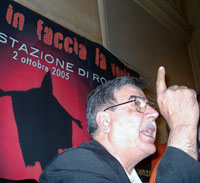‘Let Iraqis speak!’
By
John Catalinotto
Rome
Published Oct 6, 2005 9:57 PM
Anti-imperialist organizers
from 15 European countries and elsewhere, including the United States, helped
build solidarity between the anti-war movement and the Iraqi resistance at a
working meeting held here on Oct. 1 and at a militant public rally the next day
before a standing-room-only crowd.
|
Awni al-Kalemji, spokesperson for
the Iraqi Patriotic Alliance in Europe.
|
The Free Iraq Committee of Italy, which
organized the events, and its counterparts in other European countries aim at
providing a platform in the “West” for authentic representatives of
the Iraqi resistance to the U.S.-led occupation.
To move toward that goal,
the working meeting decided to organize a European tour for Haj Ali al-Qaysi,
the hooded prisoner of Abu Ghraib who has become a symbol of the brutal torture
U.S. forces inflict on occupied Iraq.
A full-fledged conference had been
planned for Oct. 1-2 in Chianciano, Italy, that would have allowed the Iraqi
representatives to speak and have launched Haj Ali’s tour. Representatives
of six diverse civilian organizations active in Iraq who give political support
to the armed resistance had accepted invitations to participate.
The
Italian authorities, under pressure from the U.S. government, refused visas to
the resistance spokespeople for reasons of alleged national security. They then
used a bureaucratic maneuver at the last minute to deny a visa to Haj Ali,
claiming he needed a six-month resident permit from Jordan, not the three-month
one he had.
The Free Iraq Committee’s struggle against these
denials of democratic rights aroused sympathy and solidarity for the event from
the Italian peace movement, rank-and-file union groups (COBAS) and many
progressive individuals. The fight for these rights will continue to be part of
the focus of the struggle to hold, as soon as possible, an important conference
of that type either in another European country or in Italy.
Rally
applauds resistance
Iraqis who live in Europe and support the
resistance spoke at the rally. The key talk was by Awni al-Kalemji, spokesperson
of the Iraqi Patriotic Alliance (IPA). To the cheers of the mostly Italian
audience, al-Kalemji said that the U.S. had lost the military battle for Iraq
and that in the end the Iraqis would defeat the occupation.
Al-Kalemji
also spoke of the attempt to get in touch with the IPA’s secretary,
Abduljabbar al-Kubaysi, a leading political figure among the over 100,000 Iraqis
held in 200 U.S.-run prisons in Iraq. Neither his family nor any legal
representatives have been able to visit him, let alone to prepare his
defense.
An international team of jurists and attorneys is protesting this
illegal seizure of al-Kubaysi by the U.S. occupation forces, and is attempting
to get access to him. Kawthar al-Kubaysi, his wife, was scheduled to speak at
the Oct. 2 meeting but had to cancel to continue her attempts to reach her
husband.
Another important speaker from the Arab countries was Abdulhaleem
Kandil, a spokesperson of Kifaya (Enough) in Egypt. This group supports the
Iraqi resistance and works in Egypt to extend the democratic rights of the
people. There are, he said, 20,000 political prisoners under the pro-U.S.
Mubarak regime in that country.
From the United States, the Interna tional
Action Center participated on the presiding committee of the conference and also
described the recent upsurge in struggle in the U.S. following the “Camp
Casey” actions and the reaction to Hurricane Katrina.
In addition,
a student from San Francisco State College studying in Florence described her
group’s actions in stopping recruiting on campus.
Among the
well-known personalities speaking at the rally was Giovanni Fran zoni of the
Saint Paul base community in Italy. Franzoni is a former priest and writer known
for his contribution to Liberation Theology. Swedish author Jan Myrdal and
French philosopher George Labica sent statements of solidarity.
Impulse
for Italian movement
Leonardo Mazzei of the Free Iraq Committee read a
statement that the delegations from 15 countries had agreed upon the day before.
The goals included the strengthening of a network of groups in the various
countries giving political support to the resistance; organizing a coordinated
tour for Haj Ali; and going forward with the attempt to hold a conference in
Europe like the one originally planned in Italy.
As the committee was
making its report, the campaign had already made a big breakthrough in Italy
itself. When the conference was first proposed, the Free Iraq Committee was
isolated in the anti-war movement and got no favorable publicity, even in the
left media. On Oct. 1, however, the independent leftist daily newspaper Il
Manifesto ran a front-page story on the Italian government’s refusal to
grant a visa to Haj Ali.
The organizers said that this shift meant that
the question of solidarity with the Iraqi resistance was now part of the
discussion in the anti-war movement and among the political
parties.
Catalinotto represented the Interna tional Action Center at
the conference.
Articles copyright 1995-2012 Workers World.
Verbatim copying and distribution of this entire article is permitted in any medium without royalty provided this notice is preserved.
Workers World, 55 W. 17 St., NY, NY 10011
Email:
[email protected]
Subscribe
[email protected]
Support independent news
DONATE


